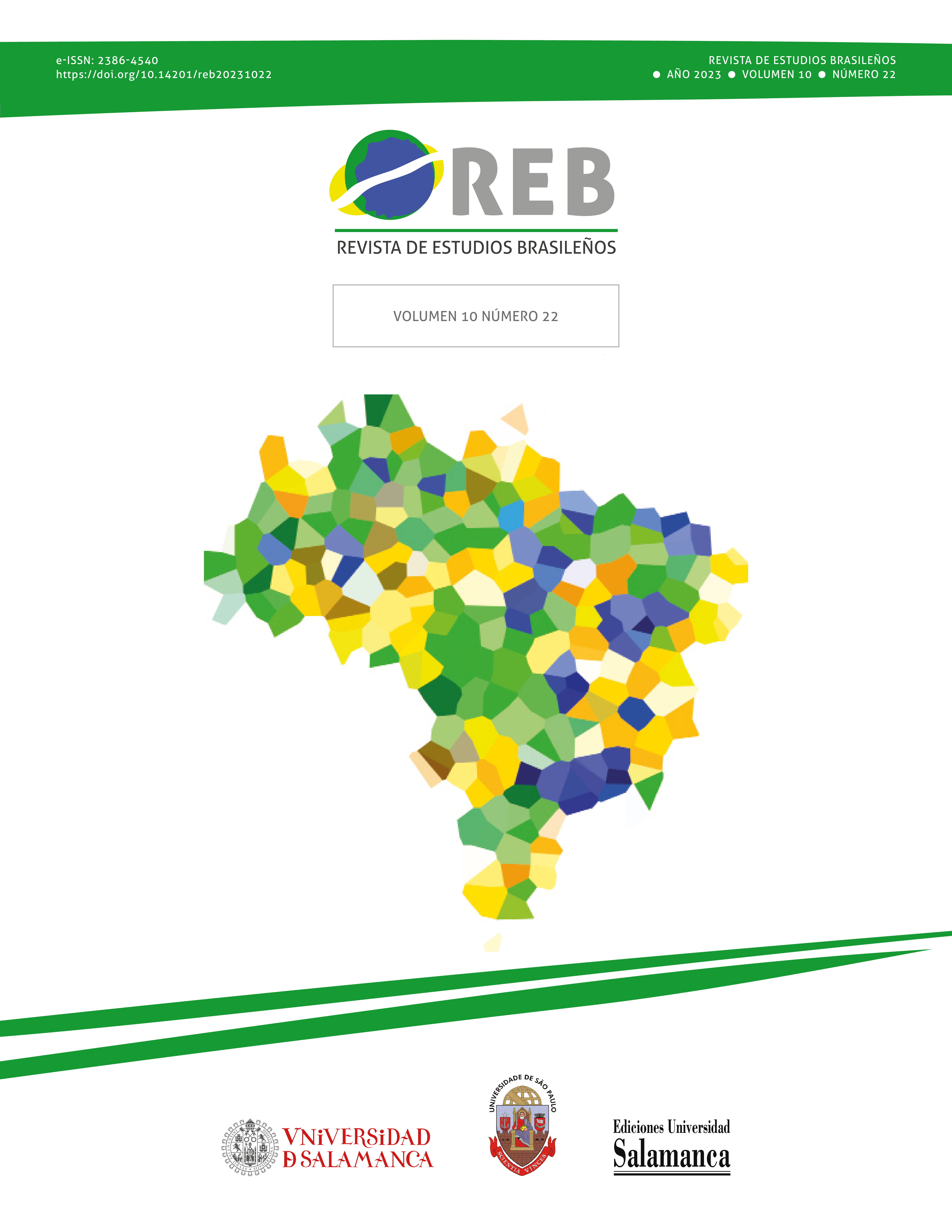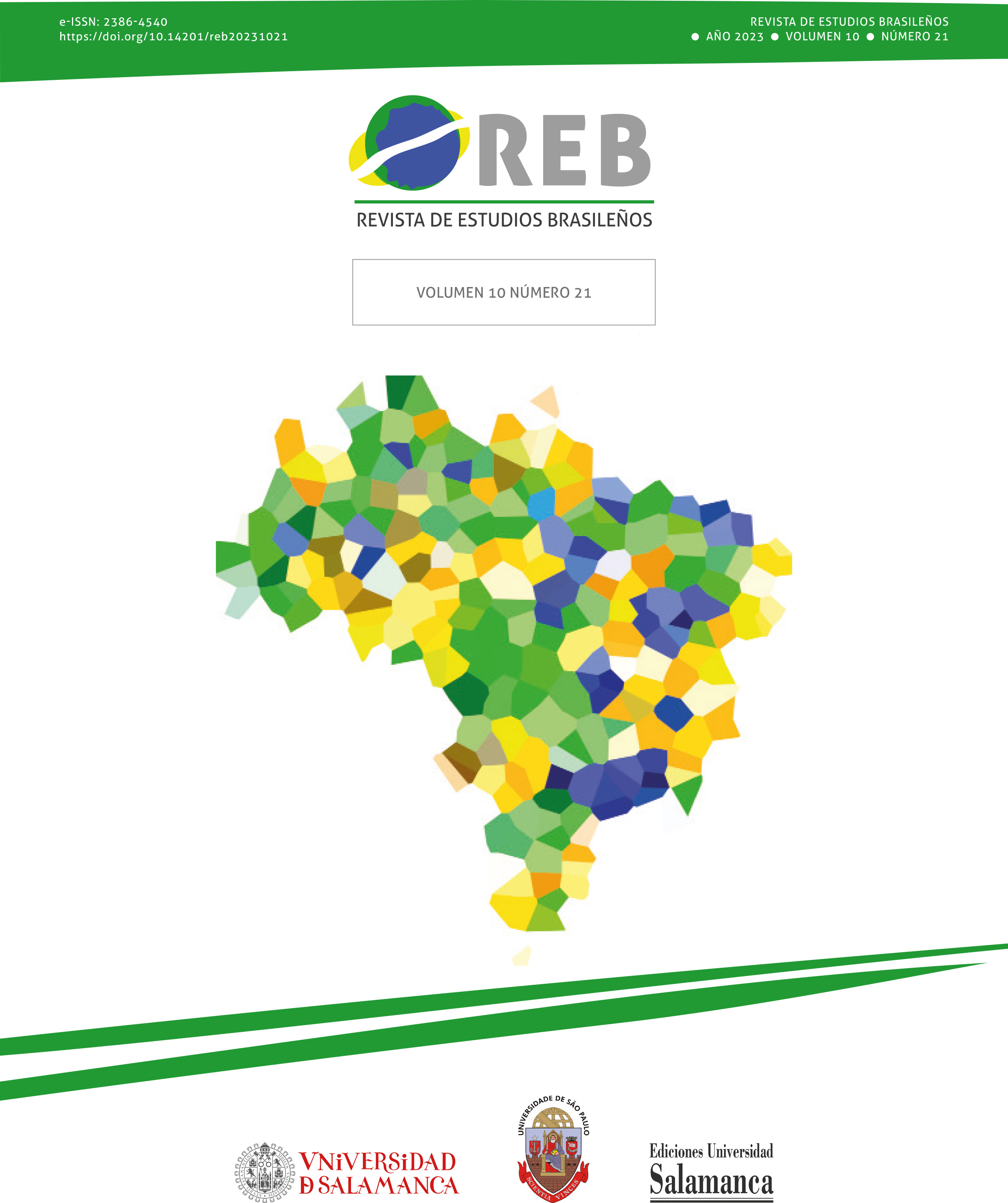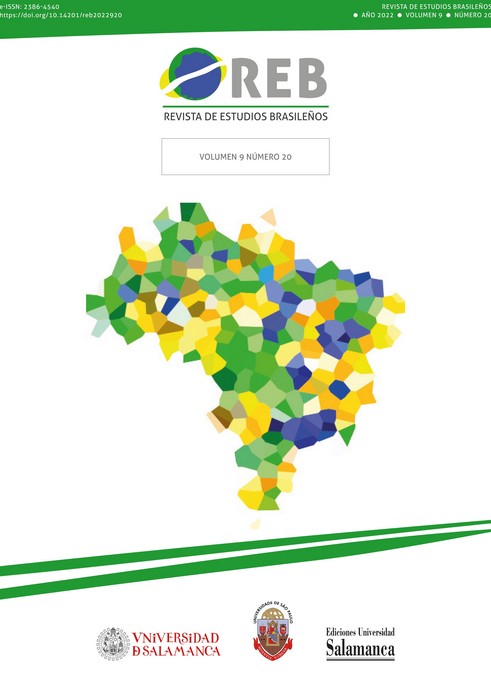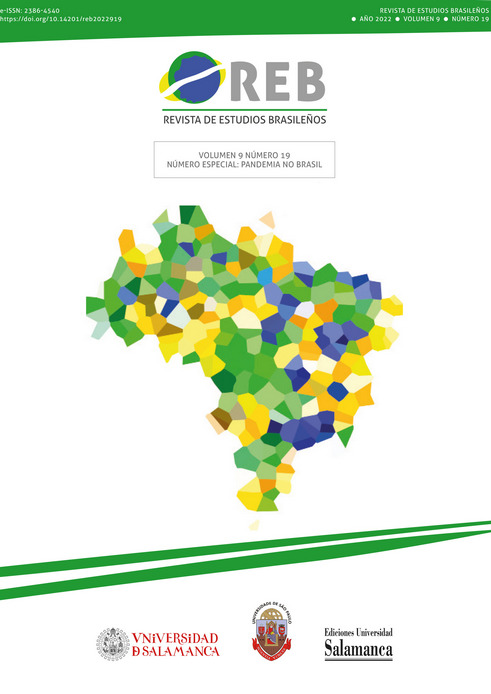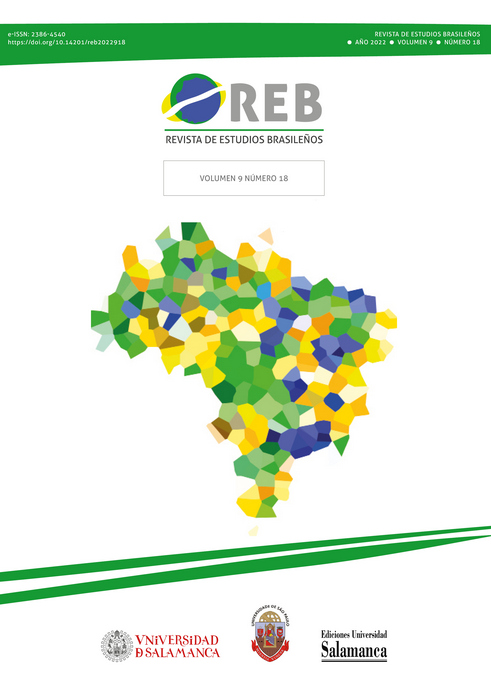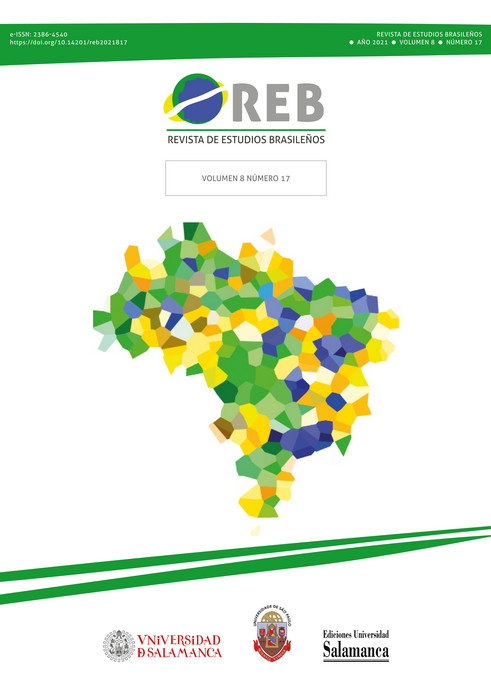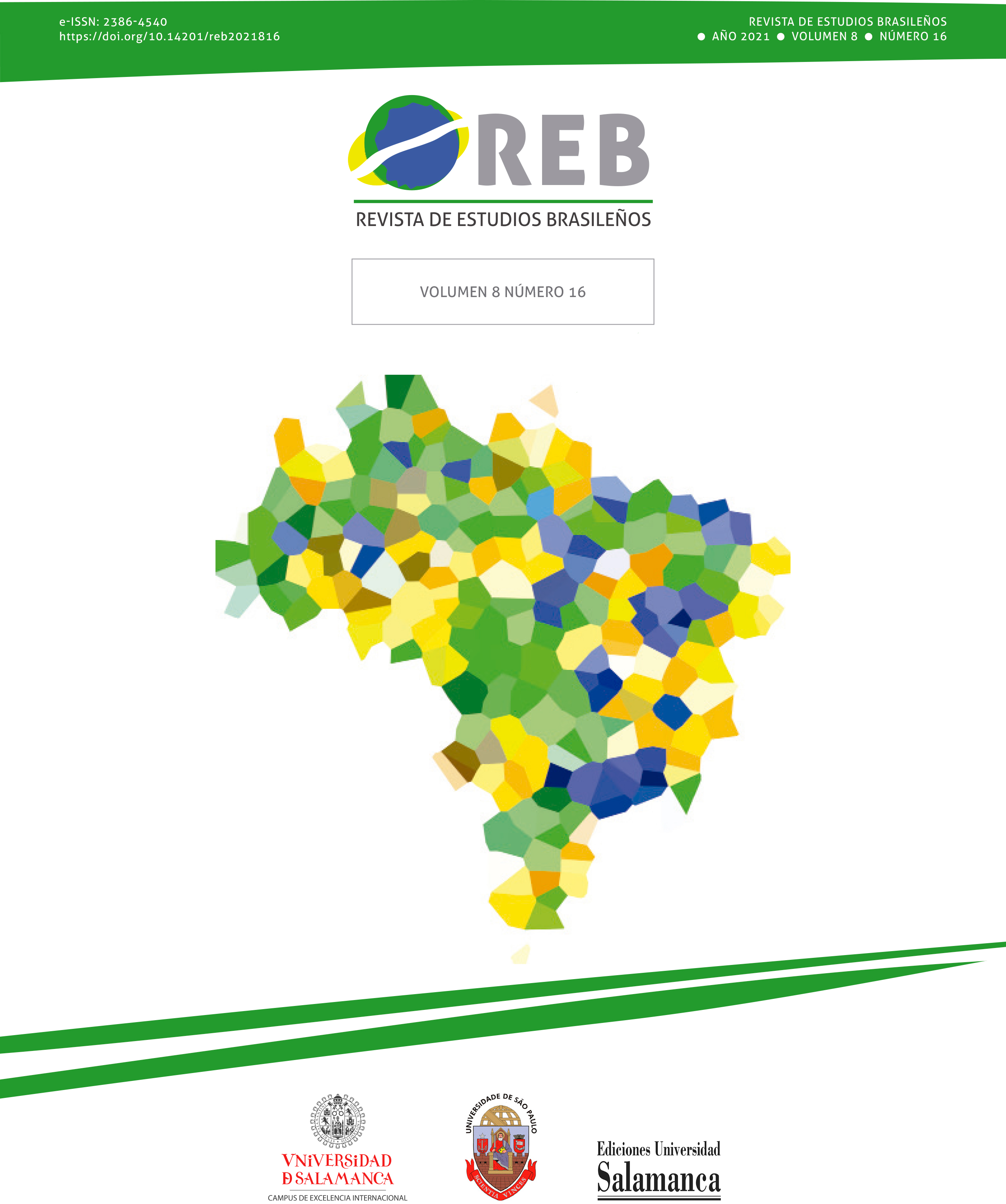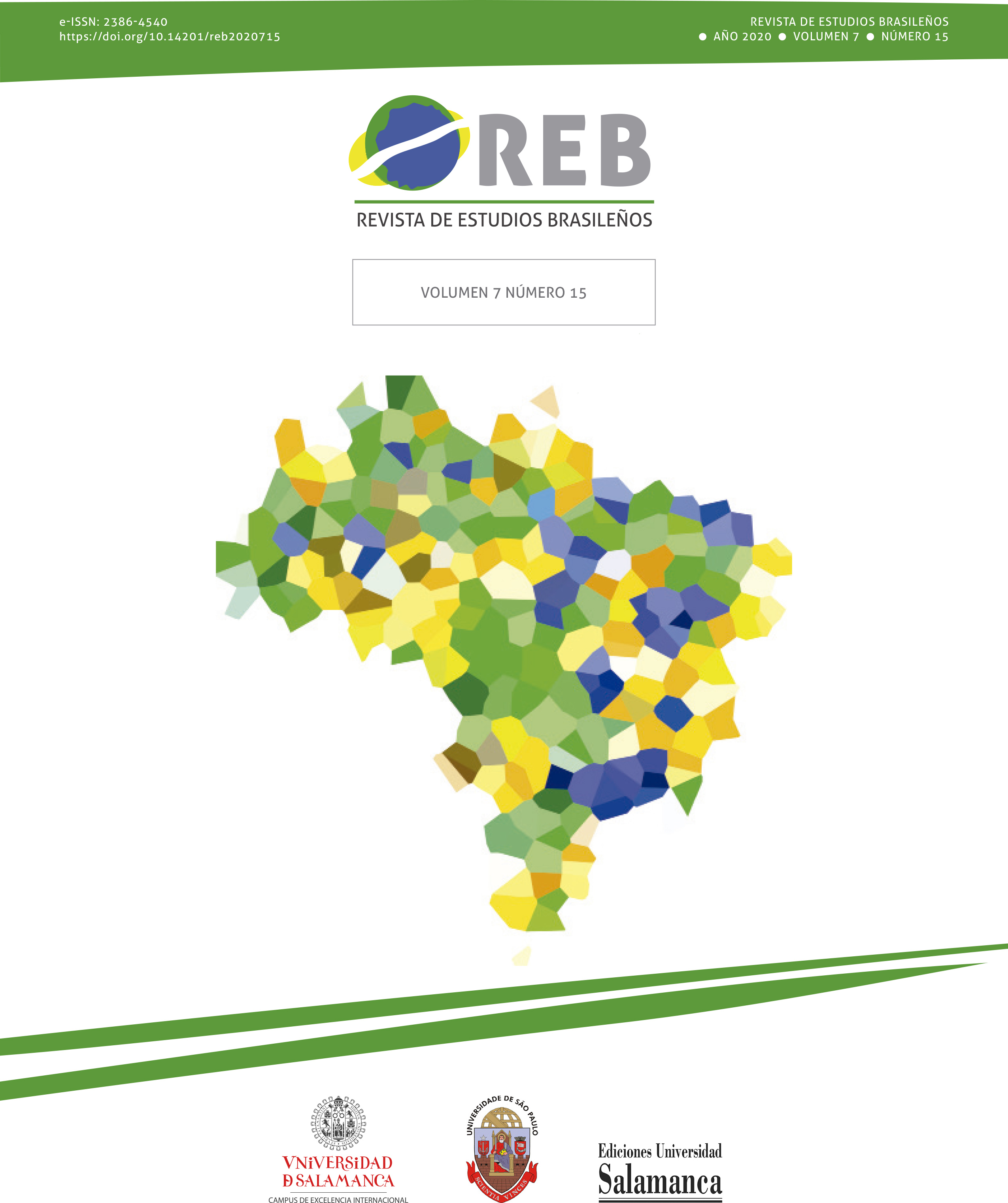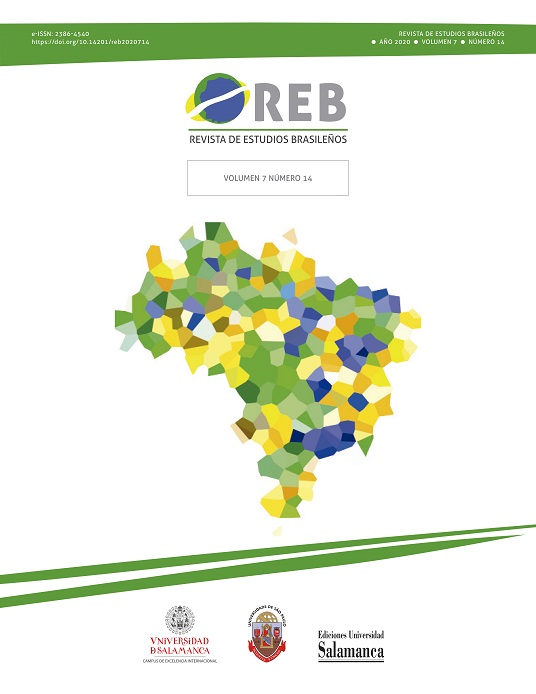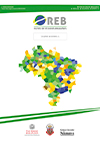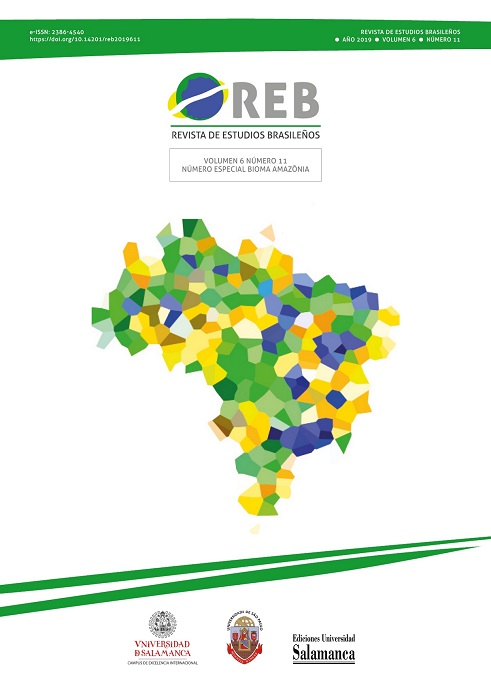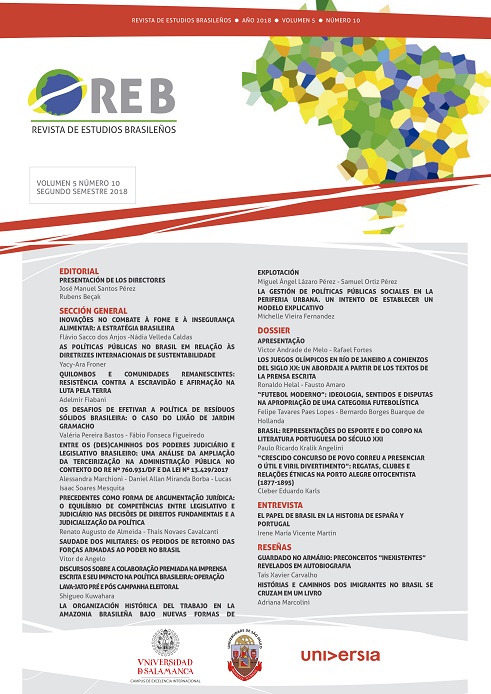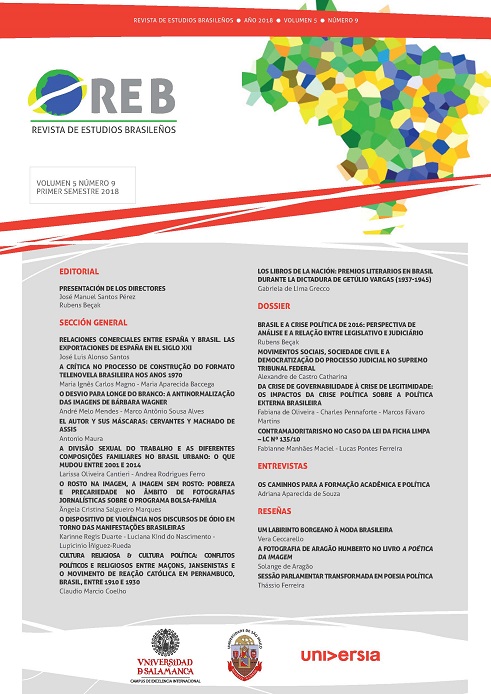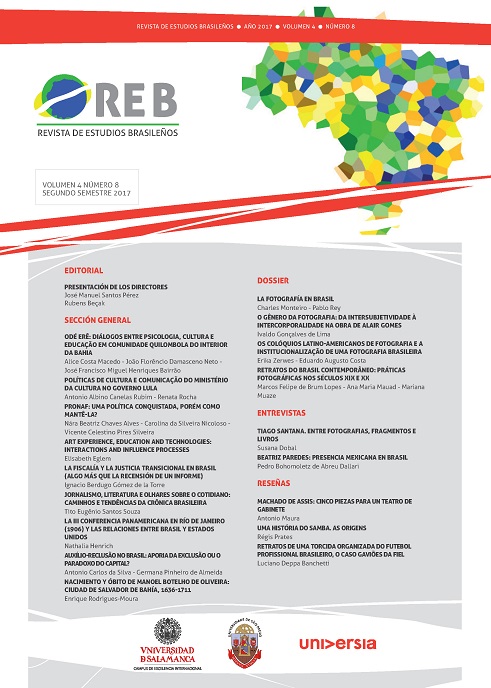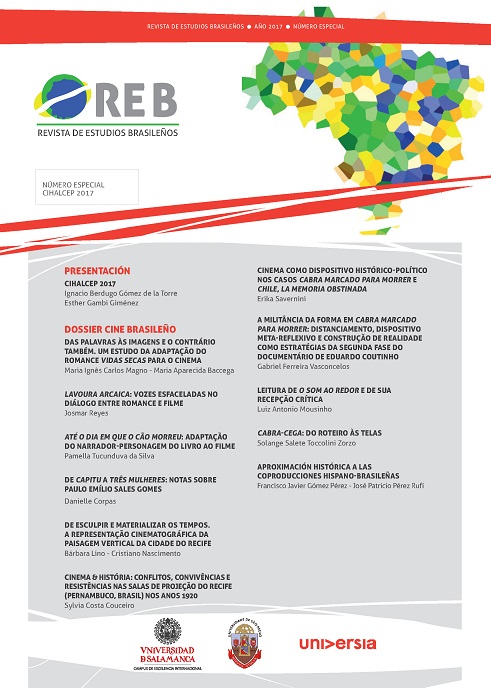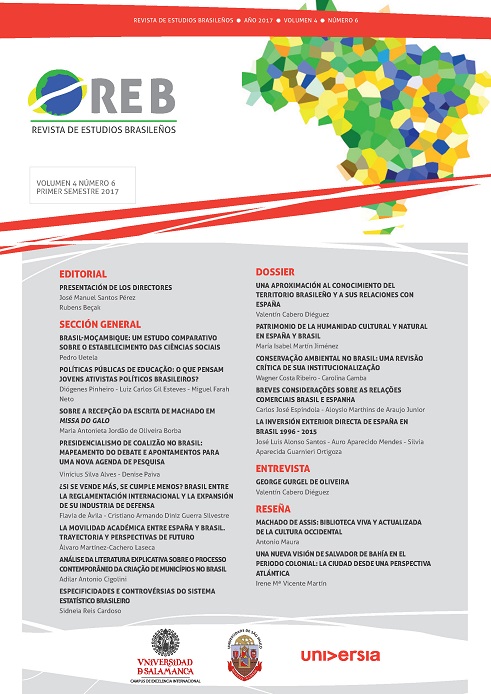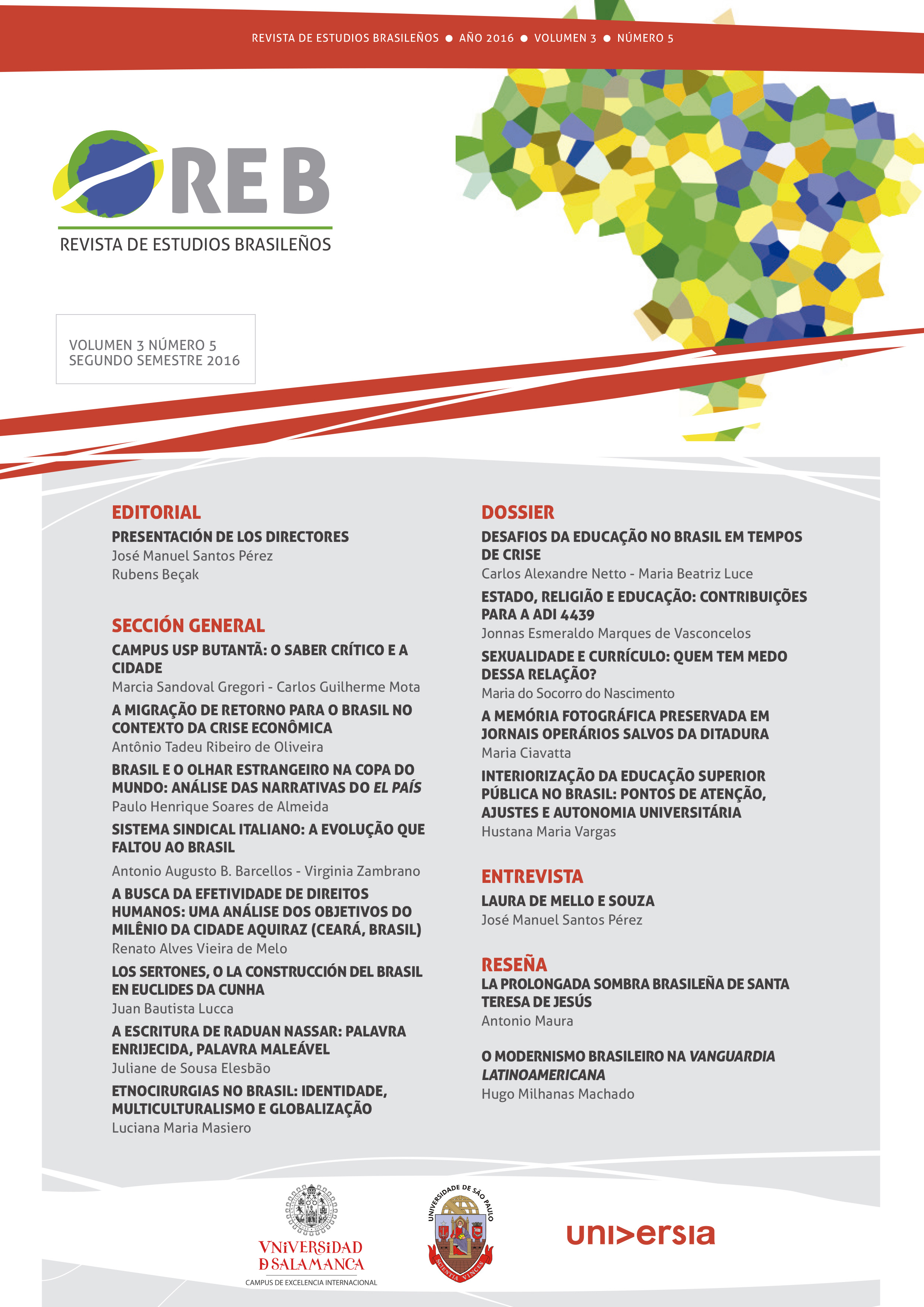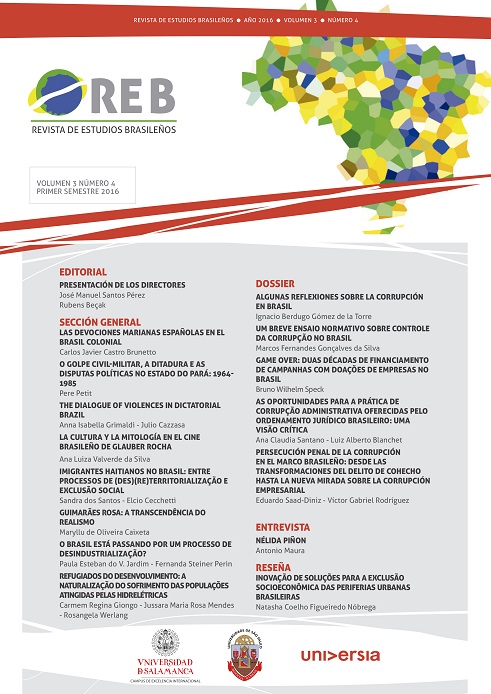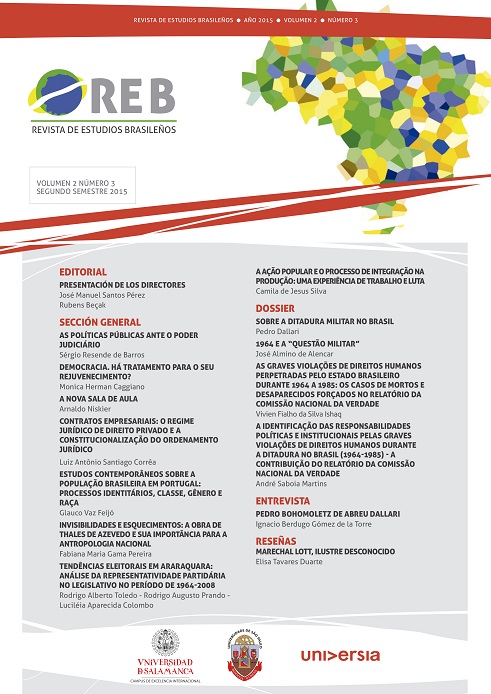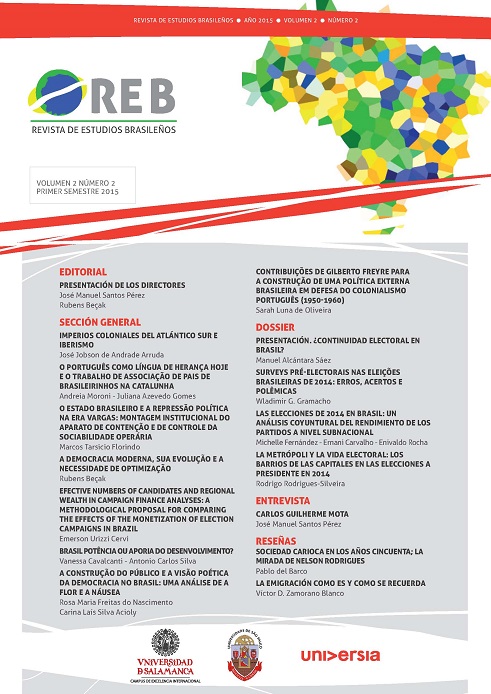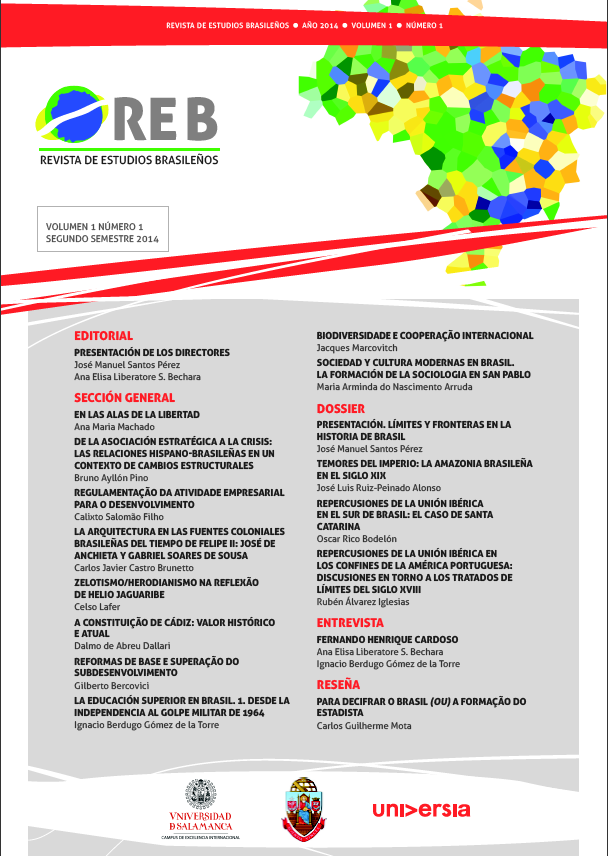Archives
-
Second Semester 2023
Vol. 10 No. 22 (2023)The complexity of Brazilian reality serves as an invitation to reflect upon it, deepening the understanding of its past, present, and the multiple challenges that must be faced in the future. Within this framework, the thematic diversity and the relevance of the issues addressed stand out as the defining features of the studies compiled in this issue. The articles gathered here address issues related to the environment and the urgent need for its preservation. Likewise, other works, from a historical perspective, analyze aspects of Brazilian society in the nineteenth century, the relationship between literature and its production context, as well as comparative studies. Education and culture within Brazilian society also hold a prominent place, with research focusing on higher education, foreign language teaching, media discourse, and identity constructions. This issue also features a particularly revealing interview with Ricardo Rezende Figueira, Professor of Human Rights at the Federal University of Rio de Janeiro (UFRJ, Brazil), in which it is discussed how the State’s omission in certain areas and regions jeopardizes the fundamental rights guaranteed by the Brazilian Constitution. We express our sincere gratitude to the authors for their valuable contributions, as well as to the external reviewers and editorial team, whose efforts make the publication of this journal possible. We wish all our readers an enriching reading experience. -
First Semester 2023
Vol. 10 No. 21 (2023)The Revista de Estudios Brasileños addresses in the dossier of this issue a classic and central theme of current scientific thought: the relationship between Social Sciences studies and Science and Technology studies. In the following pages, a specific but plural aspect is analyzed: the study, from the social sciences, of the performance and content of Science and Technology studies. It is plural because, as highlighted in the introduction to the dossier and reflected in the diversity of the works collected here, the content of the different Social Sciences and the content of what are known as 'pure sciences' is very different. The History of Science is also that of the incorporation into it of the Social Sciences, which always involve a projection of values of a very different nature onto the reality to be analyzed, which is often the result of research inherent to the experimental sciences. This undoubtedly brings the relationship between experimental sciences and Social Sciences to the forefront, making the subjects of reflection very plural and making it especially interesting to analyze, from the Social Sciences, not only the results of the research of the experimental sciences, but also the reasons that lead them to choose certain research topics and the evaluation of the method employed. Therefore, the studies in the dossier invite the reader of a Social Sciences journal, such as the Revista de Estudios Brasileños, to reflect on the other sciences, not to consider them as something distant, but on the contrary, as a knowledge connected to their research and their own decisions. -
Second Semester 2022
Vol. 9 No. 20 (2022)The Revista de Estudios Brasileños reaches its 20th issue and does so in an important year, the Bicentennial of Brazilian Independence. This special anniversary could not be ignored by the journal and the content of the Dossier is dedicated to it. The dossier is coordinated by the current director of the Centro de Estudios Brasileños, professor at the University of Salamanca, and specialist in Brazilian History, José Manuel Santos. In the section were published six articles from authors from different universities and different countries, who analyze some aspects of the roots of current Brazil, Independence itself, and the first problems to be addressed by the new State. This issue is completed with three attractive interviews. The first one is with Stuart B. Schwartz. This Yale’s professor is probably one of the most recognized and influential specialists among historians of colonial Brazil. The second interview is with the professor and researcher at USP, Prof. Amancio Jorge de Oliveira, vice director of the Ipiranga Museum, in the occasion of the reopening of the institution, one of the most significant events of the Bicentennial, which can be valued as a success, as it makes it possible to relive this significant moment of Brazil's Independence. In the last interview, Prof. Pedro Dallari (USP) interviews Rubens Ricupero, responsible, in 2022, for the José Bonifácio Chair, of the Institute of International Relations (IRI, USP), whose research topic was the Bicentennial of Independence from Brazil. All that makes this news issue of the Revista de Estudios Brasilñeos particularly interesting for those who wants to know more about the past or present of Brazil. -
Special Issue Pandemic in Brazil
Vol. 9 No. 19 (2022)The theme of this special issue of Revista de Estudios Brasileños, from the Center for Brazilian Studies at the Universidad de Salamanca, deals with the impacts and management of the COVID-19 pandemic in Brazil. -
First Semester 2022
Vol. 9 No. 18 (2022)This issue we present now corresponds to the first volume of the year 2022. The journal brings together a total of nine articles in the General Section that, as always, analyze different aspects of the Brazilian reality. Education and indigenous culture, as well as public policies for the Brazilian Amazon region once again occupy several pages of this publication, highlighting the relevance of the topic for Brazilian present moment. The Dossier is dedicated to a subject very dear to the USAL: the teaching and learning of Spanish, in this case, focused on the Brazilian reality. The section was coordinated by professors Andréia Roder Carmona-Ramires (Universidade Estadual do Paraná, UEPR, Brazil) and Odair Luiz Nadin (Universidade Estadual Paulista, Unesp, Brazil), responsible for selecting the material that we now offer to our readers. In addition to the section presentation article (signed by the coordinators), the Dossier includes the articles of Marcella Nascimento Fernandes and Letícia Coroa do Couto, about the experience of carrying out an extension course dedicated to Spanish for Specific Purposes. Next, we have the article by Graziellen Gelli Pinheiro Lima, which presents an analysis of the Spanish course programs in the federal universities of the Brazilian Northeast; and, closing the section, the work of Glória de Fátima Pinotti de Assumpção, who contributes with a discussion technique about the teaching of Terminology in Technical Vocational Education of Secondary Level. To finish, we would like to greatly appreciate the contribution of all the authors, collaborators and all the professionals who have directly or indirectly contributed to the preparation of this issue that we finally publish. We wish all readers enjoy reading. -
Second Semester 2021
Vol. 8 No. 17 (2021)In 2001, the Universidad de Salamanca created the Centro de Estudios Brasileños, with the aim of promoting academic and exchange relations between the University and Brazilian Higher Education institutions. Since then, the CEB has had the collaboration of the Embassy of Brazil in Madrid, the Junta de Castilla y León and the Fundación Cultural Hispano-Brasileña, among many other national and international academic and cultural institutions. The Revista de Estudios Brasileños, created in 2014, is one of the initiatives promoted by the CEB, as part of its commitment to academic cooperation and scientific dissemination about Brazil. And for this, the collaboration with the University of São Paulo is decisive, in the sense of strengthening the dialogue for the dissemination of knowledge about Brazil and the internationalization of the University and this Center. In this sense, the reader of this issue will find, in the "Varia" section, the article entitled "Twenty years later", which tells the history of the institution, illustrated by a set of photographs that collect some important moments of the history of CEB. As in all issues, the REB publishes in the "General Section" articles that address different topics on Brazil, maintaining the plurality of content and analytical approaches. The "Dossier" brings together seven articles that, from different perspectives, address the issue of sustainable development in Brazil. The studies gathered in the section analyze some consequences of the pandemic in Brazil, the possibilities of tourism as a practice for regional development, photovoltaic energy, solid waste treatment, the importance of a sustainable urbanization process and the Brazilian environmental policy in comparative perspective. This issue also includes an interview conducted by Prof. Ascensión Rivas Hernández to the Brazilian writer, academic and member of our Advisory Council, Ana Maria Machado. The writer was honored at the second edition of the International Congress of Brazilian Literature, which the CEB organizes every two years, in collaboration with the Brazilian Academy of Letters. In the interview, Ana Maria Machado talks about her work as a writer and her doctorate under the supervision of Roland Barthes. Finally, in this issue, Ignacio Berdugo (co-director of the REB since 2022), signs an article on the challenges of international criminal law in the Brazilian Amazon. We cannot finish this presentation without thanking enormously the contribution of all the authors, collaborators, reviewers and all the professionals who have worked so that this number has finally seen the light. We wish you all a happy reading. -
First Semester 2021
Vol. 8 No. 16 (2021)Between the second half of 2020 and the beginning of 2021, the Covid-19 pandemic, caused by the Sars-Cov-2 virus, continued to grow at an alarming rate, reaching all parts of the planet and causing damage in all continents. Two of the most affected countries, certainly with different responses to the problem, were Spain and Brazil, where this journal is edited. The controversial reaction of the Brazilian authorities, with occasional lockdowns of little effectiveness, led to the rapid spread of the disease in the last months of 2020 and the first days of 2021. The situation became critical in many cities, especially in Manaus, where an alleged herd immunity was not enough to contain a new wave that, according to virologists, corresponds to a new strain of the virus, called "Brazilian variant". The expansion of this variant has caused a restriction on a global scale of air communications with Brazil, with the result that we currently have the lowest level of contact between the country and Spain/Europe in the last 20 years. No one is free from the severity of these facts and the impact they have and will have on international relations and economic, social, and academic exchanges between our countries. Fortunately, vaccination campaigns have begun, although they are progressing at very different rates in different regions and states. An objective observation shows that Brazil has low vaccination rates - per million inhabitants - even if the changes in the Ministry of Health, with the replacement of ministers, indicate that there is an effort to modify the situation and accelerate the pace of vaccination. From the Revista de Estudios Brasileños, we express our solidarity and sentiments of sympathy to the families and loved ones of the victims of this terrible disease. With this number 16, the REB continues and reaffirms its commitment to the diffusion of research carried out in and about Brazil. Happy reading! -
Second Semester 2020
Vol. 7 No. 15 (2020)We reached number 15 of our Revista de Estudios Brasileños. It is an achievement to celebrate and for several reasons. In the first place, the constant publication of our editions, bringing the best to deal with in the presentation of issues related to Brazil, in the perspective of the academic-scientific dialogue proposed at the time of its foundation. It was a feat to do this at a time of extreme crisis in the publishing sector, not only caused by the global economic crisis, but, above all, by the specific perspective of the market, with huge competition with other media. Last but not least, there was also the unprecedented crisis caused by the Covid-19 pandemic, with the worldwide enactment of restrictions of various types, including lockdowns, all of which made it difficult to maintain the regularity of editorial publications. We can therefore say that we have won. We managed to close the editorial cycle of the year 2020, with this emblematic issue, within our expected regularity of editions, carried out with Ediciones Universidad de Salamanca, with the always noted quality put in the endeavor. The quality of the articles and reviews brought speaks for itself. In this issue, the dossier is dedicated to the Brazilian Amazon, coordinated by professors Raimunda Nonata Monteiro (UFOPA, Brazil), Enaile do Espírito Santo Iadanza (UnB, Brazil) and Helena Maria Martins Lastres (UFRJ, Brazil). In the interview section, we have two very interesting ones, namely, that with Bruno Ayllón Pino, a politologist and specialist in Brazilian international relations, conducted by José Manuel Santos Pérez and Elisa Tavares Duarte, co-director and editor of REB respectively, and the one made with Fernanda Viegas Reichadt, collaborator of the Institute for Advanced Studies at USP, about the panorama of indigenous lands in the face of the Covid-19 pandemic, conducted by Caio Rodrigo Albuquerque, journalist at USP's “Luiz de Queiroz” School of Agriculture. We are sure that, once again, we have fulfilled the objective that has guided our REB since its foundation: to offer first-rate literary material and provoke reflections and considerations of magnitude on the studies it proposes. Happy reading to all! -
First Semester 2020
Vol. 7 No. 14 (2020)La Revista de Estudios Brasileños alcanza su número 14, superando así los cinco años. Desde el último número hasta este, el mundo se ha visto sacudido por la mayor crisis desde la Segunda Guerra Mundial, derivada de la expansión global del virus que causa la covid-19. Dos de los países más afectados por la pandemia han sido, precisamente, España y Brasil, en donde se publica a la vez esta revista. Ante las alarmantes cifras de contagiados, enfermos y víctimas mortales, se han puesto en marcha medidas que han afectado a casi toda la población, sea por las consecuencias sanitarias o por las graves derivaciones económicas que los diversos grados de confinamiento han tenido en la mayor parte de países afectados. Si bien en este número no se ha podido recoger ningún texto relacionado con el tema, dado el décalage temporal que causan los call for papers y los trabajos de edición-maquetación, es intención de la REB publicar en breve un número especial que permita un análisis inicial del impacto de la pandemia en Brasil, con destacados especialistas en la materia. El número que el lector tiene entre sus manos, correspondiente a enero de 2020, tiene a un protagonista: Gilberto Freyre. Se dedica al autor pernambucano un jugoso dossier coordinado por Prof. Dr. Ángel Espina Barrio (profesor titular de Antropología de la USAL), Dr. Mário Hélio Gomes Lima (director de Memoria, Educación, Cultura y Arte de la Fundación Joaquim Nabuco/Ministerio de Educación, Recife, Brasil), y Pablo González Velasco (doctorando en Antropología iberoamericana por la USAL).En este número la REB nos presenta dos entrevistas destacadas, una de José Manuel Santos con la historiadora brasileña Maria Fernanda Bicalho y otra de Pedro Dallari con el economista boliviano Enrique García.En la sección general se han seleccionado una serie de artículos diversos que abordan cuestiones como las representaciones del “comércio de rua” en Debret, Freyre y Cecília Meireles, la configuración de la identidad de Brasil en los textos de Oliveira Vianna y Sergio Buarque de Holanda, la segregación en las ciudades brasileñas contemporáneas o la esclavitud en Belém do Pará durante el periodo colonial. Cerramos con una “Varia” en la que Pablo González Velasco y Fernando Toda nos traen interesantes datos acerca de los orígenes brasileños de Américo Castro y el testimonio directo y fotográfico de Eduardo Toda, en su paso por Brasilia, cuando la capital estaba en plena construcción. Esperamos que los lectores puedan disfrutar de estos nuevos contenidos con salud y superando poco a poco la difícil situación que vivimos. -
Second Semester 2019
Vol. 6 No. 13 (2019)With this issue 13 of the Revista de Estudios Brasileños we close our 2019 editorial. This issue presents a dossier on the 2018 Elections in Brazil, coordinated by professors Rodrigo Rodrigues-Silveira (University of Salamanca, USAL, Spain); Sonia Terron (Institute of Social and Political Studies of the University of Rio de Janeiro State, Brazil); and Emerson Urizzi Cervi (Federal University of Paraná, UFPR, Brazil).One of REB’s major challenges has been to expand its academic impact and social relevance in order to strengthen its fundamental objective: to be a communication vehicle to produce knowledge about Brazil in Spain. The entire process, from the submission of an article to its final publication, requires a series of tasks, first, an extreme respect for the intellectual production of the authors; and, integrity, transparency, quality of evaluations and, finally, publication. In addition to the publication on the journal platform, provided by USAL’s periodical publications service, the articles are also available on the journal platform of the University of São Paulo (SIBi) and in the institutional repository of USAL (Gredos), ensuring their wide dissemination and survival. Finally, we have made progress in bibliometric indicators, which are tools that help to understand the scope of the articles’ profile and of their readers; we have also maintained the dissemination degree of our published articles.We cannot conclude this presentation text without reiterating our deep gratitude to the authors who have shared their work in our journal and, especially, the invaluable collaboration of a large number of reviewers. -
First Semester 2019
Vol. 6 No. 12 (2019)The Revista de Estudios Brasileños reaches its 12th Issue in full expansion and with an international recognition of the quality of the publication. This is due to the quality of the published texts, the constancy and regularity in the biannual frequency and in the rigor of the Editorial Board and the evaluators of the magazine. To all of them go our thanks. This volume is loaded with important proposals for the analysis of Brazilian reality, present and past. -
Special Issue Bioma Amazônia e seus desafios
Vol. 6 No. 11 (2019)The Revista de Estudios Brasileños from the University of Salamanca, in the 800 years of the institution, publishes, in January 2019, a dossier on the Amazon and its challenges. The publication will bring together eleven essays, an interview with scientist Thomas Lovejoy, and four reviews focused on reference works in the environmental literature. This publication emphasizes, in its contents, the transcontinental relevance of the large biome. There is a meeting of respected specialists on its pages, echoing a discourse based on rigorous metrics and not on proselytizing that permeated the rhetoric of environmentalism.What will be read is a public class taught by people who have made the Amazon the basic goal of their research and life projects. The organizers of the work recommend to the government of the eight Amazonian countries a shared management, which takes into account the alert issued by two citizens of the world, one of them interviewed in the dossier, and the other, a Brazilian, the eminent researcher Carlos Nobre: if deforestation in the region exceeds 20% of the original vegetation, the Amazon will simply cease to be forest.The biome is in a limit situation in its capacity to recycle the water resources, through the evaporation and transpiration of the trees and their organic molecules. This process, important in the condensation of rain clouds, occurs in periods of water shortage in various areas of our continent. The Amazon, so to speak, "exports" the moisture produced in the forest. We speak, therefore, of a region notoriously solidary in environmental matters, which always sharpens the scientists’ interest and power of observation.In the dossier Bioma Amazônia e seus desafios there is a good show of what is done and of what can still be done in the region under analysis. Any approach on environmental governance, forest preservation or land reclamation will necessarily have to give centrality to the role of the Amazon, which is taken as a single biome, although geographically located in eight countries. This means that addressing their challenges in the context of climate change requires a convergent strategy of national states that share their immense biodiversity, gigantic carbon stocks, ecosystem benefits and the inherent risks of their size.The best guide to these combined actions is the content of the Nationally Determined Contributions (NDAs) signed into the Global Climate Agreement and the goals of Agenda 2030 grouped under 17 Sustainable Development Objectives. Full compliance with the goals set forth in these documents will represent, before the world, an unquestionable certificate of good environmental management in the Amazonian countries.The Amazon is one of the areas most studied by experts around the world. It represents the planet's environmental security and can host remarkable experiences with biotechnology. For the reasons outlined in this dossier, it is the most symbolic region of the Green Economy - which can be the most beneficial and fruitful revolution of our time. -
Second Semester 2018
Vol. 5 No. 10 (2018)The Revista de Estudios Brasileños publishes its tenth issue! A special Anniversary we share with our readers. A true event that can and must be celebrated! The review was created as a special forum for discussing issues related to Brazil, based on the interest aroused by the country in the international arena. This objective was already announced at the time of the launch of the magazine. From the perspective of what was intended as a "modest contribution to shed light" on its mission, we see that the REB has edited numbers that have contributed significantly to the understanding of Brazilian reality. Since its First Issue, in 2014, it has been published editions dedicated to fundamental topics to understand the Brazilian reality. Likewise, the prestige of its collaborators and interviewees should be stressed. Also, the reviews section, with select criticism of very relevant publications, has not been a little and that, without false modesty, should not be forgotten. This path so far collected is a sign of the future, of increasingly important and impactful editions, which offer an incentive to discuss issues about Brazil. -
First Semester 2018
Vol. 5 No. 9 (2018)The Revista de Estudios Brasileños publishes the ninth issue in its fifth year of editorial life, with the full consolidation of the project and a large acceptance by authors and readers. During the last few years, Brazil has experienced some of the most intense moments of its recent history, such as the organization of the World Cup, the Olympic Games in Rio de Janeiro and, in political terms, the impeachment process of President Dilma Rousseff in 2016. All these events were observed by a perplexed society, which saw the country moving from an intense collective euphoria during the last years of Lula's government and the first term of Dilma's to a feeling of deep economic, political and social crisis, whose solution cannot be foreseen and which, as a roller coaster, has led Brazilians from an exacerbated optimism to a sensation of defeat, asceticism and disaffection towards the political system and its ruling elites. Corruption cases have contributed greatly to this feeling, which, although common in Western democracies in the first two decades of the 21st century, acquires in Brazil a special dimension both for its strategic importance as well as for the depth and intensity of this unstable period. -
Second Semester 2017
Vol. 4 No. 8 (2017)With great joy comes the Revista de Estudio Brasileños to its eighth issue! A feat that should be celebrated and which demonstrates that the goals set at the time of its launch were and remain successful. The knowledge of what is important in Brazilian affairs, with the special treatment and dissemination of the editorial are a deserving celebration. -
Special Issuer Brazilian Cinema CIHALCEP 2017
Vol. 4 No. 7 (2017)Special Issue dedicated to Brazilian Cinema. This issue was organized in collaboration with the IV International Congress of History, Art and Literature in Cinema in Spanish and Portuguese (CIHALCEP 2017) of the Brazilian Studies Center, at the University of Salamanca, which took place in Salamanca, between June 28th and 30th, 2017. -
First Semester 2017
Vol. 4 No. 6 (2017)This issue presents as dossier`s theme "Una aproximación al conocimiento del territorio brasileño y a sus relaciones con España", coordinated by Professor Valentín Cabero, professor of Geography at the University of Salamanca, who also conducted an interview with Professor George Gurgel, from the Federal University of Bahia, who was deeply knowledgeable about the reality of sustainable development in Brazil. The Revista de Estudos Brasileños, in this way, contributes in its number 6 to the great debate that occurs on a global scale, and more concretely in Brazil, on the environmental challenge that humanity has raised and whose resolution will be vital for a development Stable and durable in the coming years. The number 6 also publishes in its general section texts of varied topics ranging from academic mobility between Spain and Brazil in recent years, the specificities of the Brazilian statistical system, coalition presidentialism or public policies of education in the vision of young political activists. -
Second Semester 2016
Vol. 3 No. 5 (2016)The Revista de Estudios Brasileños presents its fifth number in its third year of publishing life. Over the years, the REB had the invaluable collaboration of authors, reviewers, proofreaders and, in particular, readers that allowed the magazine to be consolidated as a reference in the dissemination of scientific knowledge produced in and about Brazil. In this issue, the Dossier "Education in Brazil" was coordinated by Professors Carlos Alexandre Netto and Maria Beatriz Luce, both from the Universidade Federal do Rio Grande do Sul (UFRGS, Brazil). The current Brazilian context and past experiences in the field of Education imposed the choice of the theme and its consequences: the discussion on secularity, sexuality and curriculum, training for employment and memory, and finally the process of internalization of higher education institutions. In the "Interview" section, the director of the Revista de Estudios Brasileños and Professor at the Universidad de Salamanca, José Manuel Santos Pérez, spoke with the historian Laura de Mello e Souza, a Professor at the Paris IV University - Sorbonne. We appreciate all the people who contributed to this issue publication and we take opportunity to reaffirm our commitment to disclosure and disseminate scientific knowledge about Brazil. -
First Semester 2016
Vol. 3 No. 4 (2016)The Revista de Estudios Brasileños reaches its third year of publishing life with this Number 4, while maintaining the commitment to act as a "knowledge bridge" between the countries involved, to do justice to the long tradition of Spanish-Brazilian cooperation, especially, the dissemination of scientific and academic diversity and affirming so, step by step, as refereed journal. -
Second Semester 2015
Vol. 2 No. 3 (2015)The Revista de Estudios Brasileños released its number 3 edition, leaving behind the embryonic stage, consolidating itself as a reference for specialized studies about Brazil in different areas of knowledge. And it does it in a big way: We released a special issue in which the National commission of truth, that has given its final report to President Dilma Rousseff on December 2014, is the biggest protagonist. On the other hand, the director of the Brazilian Study Center from Salamanca’s university, Professor. Dr. Ignacio Berdugo has interviewed the professor from São Paulo Law University, Dr. Pedro Dallari, who is the commission coordinator and responsible for the final report. On the other hand, professor Dallari coordinates the dossier fully devoted to the military period containing articles from José Almino de Alencar, Vivien Ishaq and André Saboia Martins. -
First Semester 2015
Vol. 2 No. 2 (2015)This issue of the Revista de Estudios Brasileños highlights in particular the 2014 elections in Brazil. The Dossier was coordinated by Dr. Manuel Alcántara, Professor of Political Science of the University of Salamanca. In its eagerness to approach the different aspects of Brazilian reality, REB also contains in this issue articles addressing matters in Economics, History, Language, Literature and other areas, in addition to an interview with the Emeritus Professor of History from the Universidade de São Paulo, Carlos Guilherme Mota, and a section of reviews and news. The call for papers put out in October was received with such enthusiasm that we were forced to make a selection from the many submissions. We are quite proud and thankful for the interest in REB that authors have shown. -
Second Semester 2014
Vol. 1 No. 1 (2014)Internationalization is a characteristic of our society, impinging on politics, culture, economic affairs and education. In fact, there is no single aspect of society that is not governed or at least influenced by this phenomenon. Universities must react to this current world trend through internationalization policies, which should not be limited to student exchanges or relations between researchers –which are by the way bountiful- but must also pass through institutional relations and the detection of the identifying features of other countries. Gaining in-depth insight into the cultures and knowledge of other realities is an indication of the quality of a university, since such cultures and knowledge help to train professionals in all spheres of human endeavour, and these professionals will therefore be better able to carry out their professional activities in a globalized world. The Revista de Estudios Brasileños reflects the commitment of three institutions to the challenges currently faced by universities. These are the Universities of Salamanca and São Paolo, emblematic in their respective countries, and Universia, which represents the new technologies in the service of Higher Education institutions throughout Ibero-America.
